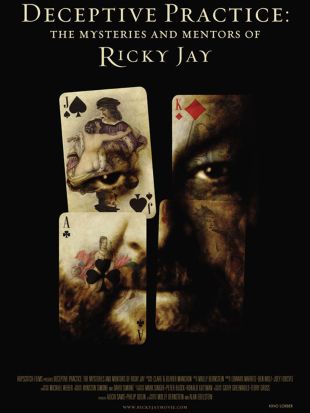
It would be challenging to think of a documentary subject with richer onscreen possibilities than Ricky Jay -- a renaissance man known equally for his virtuoso technique as a stage magician, his supporting roles in Hollywood films (House of Games, Boogie Nights), and his authorship of books on deception and Ripley's-style human "oddities." Jay's feats in the magic arena are particularly mesmerizing; this is a guy so gifted with sleight of hand that he could easily be mistaken for a supernatural conjurer -- his feats include allegedly making a two-dollar bill appear out of thin air while showering naked in a locker room, and somehow making an enormous block of ice crop up from out of nowhere on an empty table in a city diner. The fact that Jay is also one of the sweetest and most avuncular entertainers around doesn't hurt much, either.
For all of these reasons, one should laud directors Alan Edelstein and Molly Bernstein for simply creating the documentary Deceptive Practice: The Mysteries and Mentors of Ricky Jay. The movie's démarche, however, is an eccentric one, and the key to its approach lies in the title: This isn't really the analysis of Jay that one might infer. Instead, it is -- in equal measure -- the sort of surface-level exposure to Jay's magic act that a person would get from attending one of his stage shows, juxtaposed with an "inside" catalogue of the über-obscure vaudeville magicians who inspired, shaped and influenced him, such as Al Flosso, Francis Carlyle, Dai Vernon, and Tony Slydini.
If those names mean anything to you, and you've spent years pining for an onscreen monument to these gentlemen, you'll likely be thrilled by the homage that Bernstein and Edelstein construct here. If viewed on that level, the movie is entertaining enough in its own right; we're treated to fascinating rare performance footage of these guys that probably never would have been publicly seen or preserved were it not for this documentary. The film's incorporation of old photographs and footage of Jay is also so magisterial that it has to go on record as one of the great cinematic archival constructions of our time: We get dazzling pieces of esoterica, such as adorable clips of a pint-sized Jay performing tricks before a 1950s television audience, excerpts from his guest spots as a longhaired conjurer on The Dinah Shore Show, and much more. It's a cavalcade of treasures, and Bernstein and Edelstein deserve an award for weaving it together so beautifully.
Those assets notwithstanding, however, anyone hoping for a biographical profile of Jay will walk away dejected. At first glance he seems open and accessible, but as you start to listen to his on-camera disclosures, you begin to realize what a slippery and elusive character he is. He gives us tantalizing hints about his personal life -- such as his parents' decision to distance themselves from him as he grew into adulthood, and one comment that indicates he spent years looking for love with women and striking out (until he met his wife, Chrisann) -- but the buck pretty much stops there. That's as deep as our personal insights into Jay get, and the subject remains a cipher. At one point, he states that one of a stage magician's primary goals involves distracting viewers and prompting them to focus their attention elsewhere, thus leaving the door open for the prognosticator to pull his central trick. That seems to be what Bernstein and Edelstein have attempted by packing their movie with material only tangentially relevant to who Jay is; unfortunately, they aren't nearly as gifted with this sleight as he is onstage, which prevents the documentary from being completely successful.
